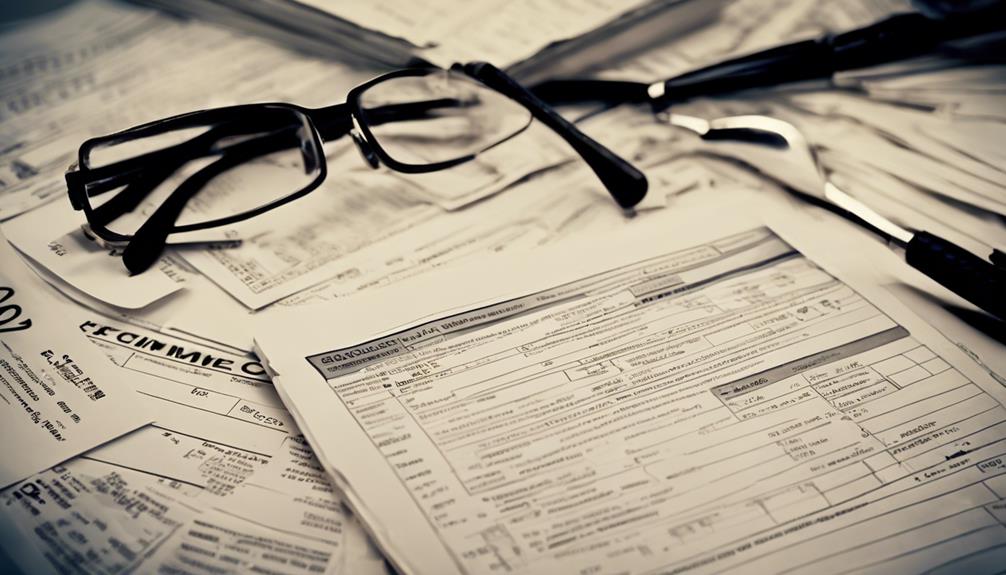- 7 Top Flite Golf Clubs XL for Improved Performance - September 28, 2024
- Top Flite Golf Clubs: Top 5 Reasons to Choose Them - September 28, 2024
- Top 3 Golf Club Fitters for a Perfect Swing - September 28, 2024
You can deduct golf club membership dues and expenses from your taxable income if you use them for legitimate business purposes, such as building relationships with clients, networking, or conducting business meetings on the course. To qualify, you'll need to document the primary business purpose of your golf activities, keeping detailed records of meetings, discussions, and expenses. Membership dues, industry association fees, and professional development costs can all be claimed as business expenses. By following IRS guidelines and maintaining accurate records, you can maximize your deductions and take advantage of these valuable business tools. Your next step is to explore how to optimize your golf club expenses.
Key Takeaways
- To make golf club membership dues tax deductible, use them for business purposes, such as client entertainment or networking.
- Accurate records of business use, including meeting minutes and receipts, must be maintained to support the deduction.
- Membership dues can be claimed as business expenses if directly related to business operations, such as industry events or professional development.
- Industry association fees and professional development costs can also be deducted as business expenses, providing access to industry research and networking opportunities.
- Consult a tax professional to ensure compliance with IRS regulations and maintain detailed records to support the deduction.
Business Purpose Over Entertainment
When claiming golf clubs as a business expense, you frequently need to demonstrate that their primary purpose is business-related, rather than purely entertainment.
To achieve this, you must establish a clear business purpose behind your golf activities. Ask yourself: Are you using golf as a means to build relationships with clients, prospects, or partners? Are you hosting business meetings or discussions on the golf course? Or, are you using golf as a way to entertain key stakeholders or reward employees?
If so, you're on the right track.
To further support your business purpose, consider the following: Are you a member of a golf club or country club that offers business networking opportunities? Do you participate in golf tournaments or events that align with your industry or profession?
Have you used golf as a platform to generate new business leads or close deals? If you can answer 'yes' to these questions, you're building a strong case for your golf clubs being a legitimate business expense.
Documenting Business Discussions
When you're documenting business discussions, you'll want to verify that you're accurately capturing the details of your meetings.
You should keep a record of meeting minutes, including the date, time, location, and attendees, as well as a summary of the topics discussed and any agreements or actions items.
Meeting Minutes Matter
How do you verify that your business discussions are accurately captured and legally binding, especially when it comes to making golf clubs tax deductible? Meeting minutes matter, and documenting them correctly is crucial. You must confirm that your meeting minutes are detailed, concise, and accurately reflect the discussions and decisions made.
Date, time, and location: Record the date, time, and location of the meeting to establish a clear timeline.
Attendees and roles: List the names and roles of attendees to identify who was present and responsible for specific actions.
Discussion topics and summaries: Provide a brief summary of each discussion topic, highlighting key points and decisions made.
Action items and assignments: Clearly outline action items, assignments, and deadlines to guarantee accountability and follow-up.
Business Purpose Defined
You must define the business purpose of your golf outing by documenting discussions that establish a clear connection between the activity and your business operations.
This means you need to record the specific business topics discussed during the outing, such as potential deals, partnerships, or client relationships. Be sure to include details like the date, time, location, and attendees.
When documenting these discussions, focus on the substance of the conversations rather than just listing general topics. For example, instead of simply noting 'discussed new marketing strategies,' specify the actual strategies discussed and how they relate to your business goals.
This level of detail will help demonstrate the business purpose of the outing and support your tax deduction claim.
Accurate Expense Record Keeping

When it comes to accurate expense record keeping, you'll need to carefully document all business-related golf expenses, including receipts, invoices, and bank statements.
You should also track each golf outing, noting the date, location, and business purpose of the event.
Recording Business Expenses
To guarantee compliance with IRS regulations and support tax deductions for golf-related expenses, accurate and detailed records of business expenses must be meticulously maintained.
As you keep track of your golf-related expenses, remember that the IRS requires specific information to validate your deductions.
Document the following essential elements in your records:
Date, location, and business purpose: Document the date, location, and purpose of the golf outing, including the names and titles of the people involved in the business discussion.
Receipts and invoices: Keep receipts, invoices, and bank statements to support the expense claims.
Business benefit or result: Record the business benefit or result of the golf outing, such as a new business contract or partnership.
Secure storage: Store your records safely, either physically or digitally, and maintain easy access to them if needed.
Tracking Golf Outings
Accurate expense record keeping for golf outings requires meticulous documentation of essential details, including the names of entertained clients, the date and location of the outing, and the specific business purpose behind the entertainment.
When tracking golf outings, you should write down the names of the people you're entertaining, the date and place where you played golf, and the reason you're entertaining them.
Keep receipts for all expenses, including meals, drinks, parking, greens fees, travel, and equipment rental.
Document where you'd your business discussion, as it must occur on the same day as the golf outing, unless your clients are from out of town.
Keep detailed records of all business-related expenses, including travel to and from golf courses, lessons, and instruction fees.
Also, note the business purpose of the outing, such as developing new business or encouraging existing relationships.
Dues as Business Expenses
You can claim golf club membership dues as business expenses on your tax return if you use the club for business purposes, such as entertaining clients or networking with colleagues. This can be a significant deduction, especially if you're a member of an exclusive country club with high dues.
To qualify, you'll need to demonstrate that your club membership is directly related to your business.
You can use your club membership for business purposes in the following ways:
Client entertainment: You take clients out for a round of golf to discuss business deals or build relationships.
Networking: You attend business events or conferences held at the club to connect with potential clients or partners.
Business meetings: You hold meetings with colleagues or clients at the club to discuss business strategies or projects.
Industry events: You participate in industry-specific events or tournaments held at the club to promote your business or services.
Professional Organization Memberships

As you navigate the world of professional organization memberships, you'll likely encounter fees associated with industry associations, expenses related to networking events, and costs tied to professional development.
These expenditures can add up quickly, but you may be able to claim them as tax deductions.
Industry Association Fees
When operating a golf-related business, joining industry-specific professional organizations can be a valuable investment, and the membership fees you pay can be deducted as business expenses. These industry association fees are considered ordinary and necessary expenses for the operation of your business, making them eligible for deduction.
Examples of deductible professional organization memberships include:
National Golf Course Owners Association
PGA of America
Golf Course Superintendents Association of America
Local golf associations or chapters
To qualify for the deduction, the primary purpose of the organization must be related to your business, and not primarily for entertainment or social purposes. Accurate records of membership dues and business-related activities must be kept to support the deduction in case of an audit.
Networking Event Expenses
Expenses incurred while attending networking events, including golf outings, sponsored by professional organizations can be deducted as business expenses if substantial business discussions take place during these events.
As a member of a professional organization, such as a bar association or trade association, you can deduct the membership dues as a business expense. Even if the organization provides some entertainment facilities or conducts entertainment activities, the dues are still deductible.
This also applies to memberships in civic or public-service-type organizations, like Lions or Rotary clubs, as long as the primary purpose is business-related, not entertainment.
When attending events or meetings of these organizations, you can deduct the expenses incurred, including golf outings, as business expenses.
To qualify, you must be able to show that substantial business discussions took place during the event. This means that simply playing golf with colleagues or clients won't cut it – you need to be able to demonstrate that you were discussing business and furthering your professional interests.
Professional Development Costs
You can further leverage your business expenses by claiming professional development costs, including memberships to professional organizations that align with your business interests. These memberships can be a valuable tool for networking, staying up-to-date on industry trends, and building relationships with potential clients.
Bar associations: If you're a lawyer, membership fees to a bar association can be deducted as a business expense.
Chambers of commerce: Membership fees to a local chamber of commerce can be deducted, especially if you participate in events and activities that promote your business.
Trade associations: Membership fees to trade associations specific to your industry can be deducted, such as a golf course owners' association.
Golf clubs: Yes, you read that right! Membership fees to golf clubs can be deducted as a business expense if you use the club for business purposes, such as entertaining clients.
Civic and Public Service Clubs
As a business owner, belonging to civic or public-service-type organizations, such as Lions, Kiwanis, or Rotary clubs, can provide opportunities for business networking, community involvement, and professional development that are directly related to your business.
These organizations are exempt from the IRS's general rule denying deductions for country club dues and other entertainment facilities, making your membership dues a legitimate business expense.
To deduct these dues, you'll need to keep accurate records of the business purpose and benefits derived from your membership.
The IRS may require documentation, such as meeting minutes, event schedules, and business-related correspondence, to support your deduction.
Trade Association Benefits

As a business owner, you're likely aware that belonging to trade associations related to your industry can provide valuable benefits, including access to industry-specific research, networking opportunities, and professional development resources that directly impact your business operations.
These benefits can be particularly useful when it comes to justifying the expense of golf clubs as a business deduction.
Some of the key trade association benefits that can support your claim include:
Industry-specific training and education: Many trade associations offer training programs, workshops, and conferences that help you stay up-to-date on the latest industry trends and best practices.
Networking opportunities: Trade associations provide a platform to connect with other professionals in your industry, potentially leading to new business opportunities and partnerships.
Access to industry research and data: Trade associations often conduct research and gather data on industry trends, which can be valuable in informing your business decisions.
Advocacy and representation: Trade associations may advocate on behalf of their members, providing a collective voice on industry issues and concerns.
IRS Guidelines and Compliance
To comply with IRS regulations and qualify as legitimate business deductions, you must adhere to IRS guidelines for business expense deductions. According to the IRS, business expenses must be 'ordinary and necessary' to be deductible. This means you must demonstrate a direct connection between your golf club expenses and your business operations.
You'll need to keep detailed records of your golf club expenses, including receipts, invoices, and bank statements. These records should include the date, amount, and purpose of each expense.
Additionally, you must be able to prove that the expense was directly related to your business. For example, if you take a client golfing to discuss a potential business deal, you should document the purpose of the outing and the resulting business benefit.
Consulting a Tax Professional

When claiming golf club expenses as business deductions, you should consider consulting a tax professional to guarantee accuracy and compliance with tax laws and regulations.
A tax professional can provide expert guidance on deducting golf-related expenses and confirm you're taking advantage of all eligible deductions.
They can help you understand laws like the Tax Cuts and Jobs Act and maximize deductions for golf-related expenses like meals, drinks, and travel.
They'll advise on keeping accurate records of business discussions, receipts, and other necessary documentation to support your deductions.
They'll help you identify which expenses are deductible, such as country club dues, and which are not, like entertainment facilities.
In case of an audit, they'll represent you before the IRS, verifying your deductions are properly supported and minimizing the risk of penalties.
Maximizing Deductible Expenses
You can substantially reduce your taxable income by maximizing deductible expenses related to golf, including meals, travel, and equipment costs, as long as you discuss business with one or more people before or after playing golf. To take advantage of these deductions, you must keep accurate and detailed records of your expenses.
Expense Categories and Deductible Expenses
| Expense Category | Deductible Expenses |
|---|---|
| Meals | Breakfast, lunch, or dinner with business associates at the clubhouse before or after playing golf |
| Travel | Gas or transportation costs, parking fees at the golf course |
| Equipment | Golf balls, golf club rental |
| Lessons | Golf lessons and instruction fees
Frequently Asked Questions
Can I Write off Golf Clubs on Taxes?
You can't write off golf clubs as a tax deduction if golfing is a personal hobby, as the IRS considers it a recreational activity, not a business expense.
How Do I Write off My Country Club Membership?
"Cry over spilt milk" – you've already paid for that country club membership, but now you're wondering if you can write it off. To deduct it as a business expense, you'll need to prove the primary purpose is for Lifestyle Perks, like networking, not pleasure.
Can I Write off a Golf Cart as a Business Expense?
You can write off a golf cart as a business expense if you use it for farm or ranch operations, like transporting farmhands or equipment, and keep accurate records, treating it as farm equipment for tax purposes.
Can I Write off a Golf Outing?
"Just like a well-placed drive, you're teeing up a great question! You can write off a golf outing as a business expense if it's directly related to Golf Networking, such as meeting clients or discussing business deals."
Conclusion
As you tee off on the green, remember that your golf clubs can be more than just a hobby – they can be a tax-saving strategy.
By following these steps, you'll be able to deduct your golf-related expenses like a pro.
So, dust off your quill and ledger, and get ready to sink a hole-in-one with the IRS.
By making your golf clubs tax deductible, you'll be driving straight towards a lower tax bill.




